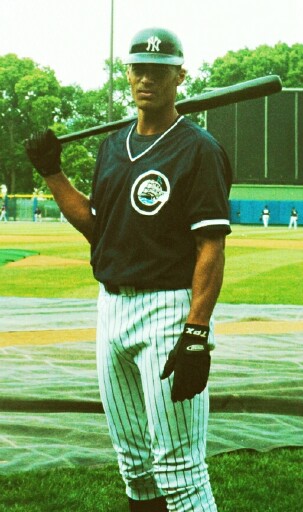|

|
| -photo
by Kyla Baldwin |
Last year was an interesting year to say the least. It was unlike any other.
I was traded at the end of Spring Training from the Philadelphia Phillies to the New York Yankees for "a player to be named
later." I still have no idea who that player is, and not that it matters much now, but there is still a curiosity
that leaves me wondering. One day I'm in camp with one team making plans for the upcoming season; the next day I'm wearing
a completely different uniform trying to get to know a whole new set of faces.
When I was traded to the Yankees, I was excited at the idea that possibly
one day I would be wearing a Yankee uniform. I knew I would be starting in Triple A, but I also remained hopeful that before
the season ended, an opportunity would arise for me in New York. I have been playing long enough to know that throughout an
entire season, one just never knows what might happen. I also knew that the year before, Alberto Castillo and Chris Widger
shuffled between Triple A and the Big Leagues as a back up to Jorge Posada. This was also encouraging because it indicated
that the Yankees were willing to use their Triple A system if necessary. In the meantime, I would remain ready in Columbus,
working, grinding, trying to find that one adjustment that would improve my game.
"Columbus Clippers, ring your bell." If you have ever been to a Clippers
game, then perhaps you may have noticed the ringing of cow bells throughout the game. A subtle ring here and a subtle ring
there followed by a barrage of rings during the "Columbus Clippers, ring your bell" theme song. Little kids, and even adults,
join in with cow bells (yes, cow bells!) in hand ready to ring in their support for the Clippers. I have no idea what the
name of this song is other than to refer to it as the Clippers theme song. Nor do I know about the history or the significance
of the cow bells. Perhaps, had I made more of a concentrated effort to listen to the words, this would not be such a mystery,
or could it be one of those in the moment songs, where if I were back in uniform at Cooper Stadium and in between innings,
the words would just suddenly come back to me?
Whatever the case may be, if you are a player that has spent an entire
season or even a portion of it in Columbus, this song will be deeply embedded into your psyche, whether you like it or not.
At some point and time, every single player on the Clippers team, and possibly the history of the Clippers, has uttered some
words or even phrases of that song. Consciously or unconsciously, you have sung "Columbus Clippers, ring your bell." Whether
it is sung willingly and openly in unison with other players and fans or just out of spite and sheer mockery; players can
not deny the affects of this song especially when heard day in and day out for an entire season. It is almost as synonymous
as the national anthem.
Triple A is probably the most active level in terms of roster moves in
all of professional baseball. A minor league system is a talent pool for major league organizations to develop. Triple A continues
to develop prospects and young players, but also consists of older players, some of which already have major league experience
and are awaiting another opportunity to return back to the big leagues. Those players act as insurance policies for the organization
and major league teams. Organizations are constantly relying on their minor league system, particularly Triple A, for help
throughout a major league season.
What happens in the major leagues may affect an entire system from top
to bottom. As players are acquired via trade, claimed on waivers, or promoted from Triple A, that team must then make room
on their roster by removing another player. Players are then either sent down to the Minors or released outright. The same
steps are taken at the Minor League level. As players are moved and sent to different levels, teams have to compensate by
moving other players in order to make room on their roster as well. When a player is brought up or sent down, it may set off
a chain reaction throughout the entire system. This will occur until a roster spot is readily available or a player is released.
This type of movement can be unsettling for players, managers, and teams who are trying to remain competitive and form some
sort of consistency.
-Marcus Jensen
*FEEDBACK*
Jensen @ Baseball-Reference.com
Simply Baseball Notebook
DISCLAIMER: All pictures are
assumed to be in the public domain. No violation of copyright is intended here. If one of the photos above is not in the public
domain, please notify us and it will be removed.
|

